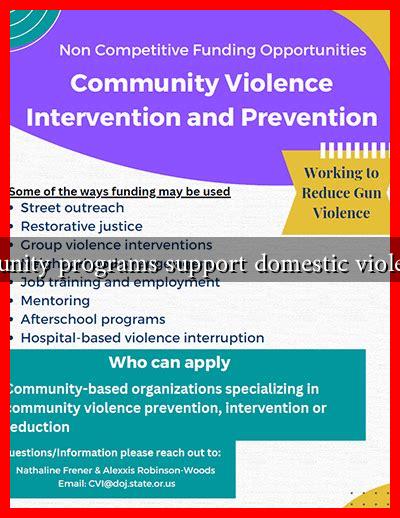-
Table of Contents
- How Can Community Programs Support Domestic Violence Prevention?
- The Importance of Community Involvement
- Types of Community Programs for Domestic Violence Prevention
- 1. Educational Workshops
- 2. Support Groups
- 3. Advocacy and Outreach Programs
- Case Studies: Successful Community Programs
- Statistics Highlighting the Need for Community Programs
- Conclusion
How Can Community Programs Support Domestic Violence Prevention?
Domestic violence is a pervasive issue that affects millions of individuals and families worldwide. According to the World Health Organization, approximately 1 in 3 women and 1 in 4 men have experienced physical or sexual violence from an intimate partner. Community programs play a crucial role in preventing domestic violence by raising awareness, providing resources, and fostering a supportive environment. This article explores how community initiatives can effectively contribute to domestic violence prevention.
The Importance of Community Involvement
Community involvement is essential in addressing domestic violence for several reasons:
- Local Understanding: Communities have unique cultural and social dynamics that influence the prevalence and perception of domestic violence. Local programs can tailor their approaches to meet specific community needs.
- Building Trust: Community programs often have established relationships with residents, making it easier to build trust and encourage individuals to seek help.
- Resource Accessibility: Local initiatives can provide immediate access to resources such as shelters, counseling, and legal assistance.
Types of Community Programs for Domestic Violence Prevention
Various community programs can be implemented to combat domestic violence effectively. Here are some key types:
1. Educational Workshops
Educational workshops can raise awareness about domestic violence, its signs, and its consequences. These workshops can target different groups, including:
- Schools: Programs in schools can educate students about healthy relationships and consent, helping to prevent future violence.
- Workplaces: Employers can offer training sessions to help employees recognize signs of domestic violence and understand available resources.
- Community Centers: Local centers can host workshops for families, focusing on communication skills and conflict resolution.
2. Support Groups
Support groups provide a safe space for survivors of domestic violence to share their experiences and receive emotional support. These groups can be organized by:
- Nonprofits: Organizations like the National Domestic Violence Hotline offer resources and can help establish local support groups.
- Faith-Based Organizations: Many religious institutions provide support groups that focus on healing and recovery.
3. Advocacy and Outreach Programs
Advocacy programs work to influence policy changes and raise awareness about domestic violence. These initiatives can include:
- Public Awareness Campaigns: Campaigns can utilize social media, local events, and public service announcements to educate the community.
- Collaboration with Law Enforcement: Partnerships with local police can help ensure that officers are trained to handle domestic violence cases sensitively and effectively.
Case Studies: Successful Community Programs
Several communities have successfully implemented programs that have significantly reduced domestic violence rates:
- The Domestic Violence Prevention Program in San Diego: This program combines education, advocacy, and support services, resulting in a 30% decrease in domestic violence incidents over five years.
- The “Love is Respect” Campaign: A national initiative that focuses on educating young people about healthy relationships, which has reached over 1 million students across the United States.
Statistics Highlighting the Need for Community Programs
Statistics underscore the importance of community programs in preventing domestic violence:
- According to the National Coalition Against Domestic Violence, nearly 20 people per minute are physically abused by an intimate partner in the U.S.
- Communities with active prevention programs report a 50% higher likelihood of individuals seeking help compared to those without such initiatives.
Conclusion
Community programs are vital in the fight against domestic violence. By providing education, support, and advocacy, these initiatives can create a safer environment for individuals and families. As communities come together to address this issue, they can foster a culture of respect and understanding, ultimately reducing the prevalence of domestic violence. It is essential for local governments, organizations, and residents to collaborate and invest in these programs to ensure a brighter future for all.
For more information on domestic violence prevention resources, visit the National Coalition Against Domestic Violence.

